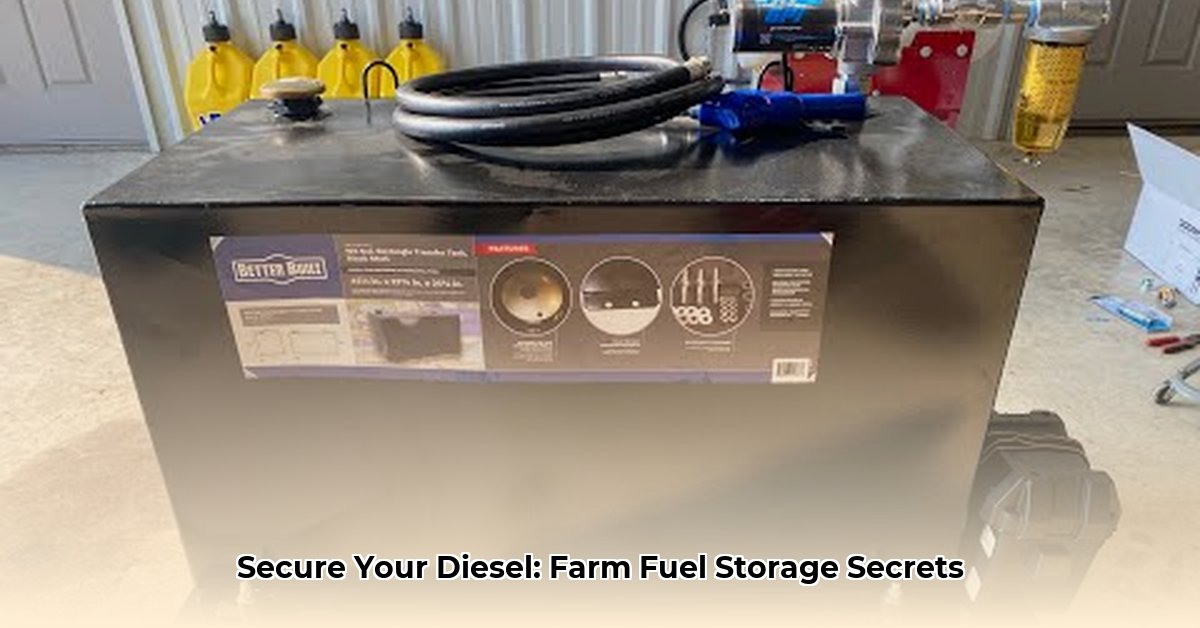
Running a successful and sustainable farm requires careful attention to detail, and proper diesel fuel storage is paramount. This guide provides actionable steps for choosing and maintaining safe and efficient fuel storage solutions from Tractor Supply, minimizing environmental impact and maximizing operational efficiency. Ignoring proper diesel storage practices can lead to costly spills, equipment downtime, and environmental damage. Let's ensure your farm operates smoothly and responsibly.
Choosing the Right Diesel Fuel Container: Size and Safety
Tractor Supply offers a range of diesel fuel storage options, from small 5-gallon safety cans ideal for smaller tasks to larger, 105-gallon tanks suitable for larger operations. Selecting the appropriate size depends on your farm's fuel consumption and storage needs. Consider your equipment's fuel capacity and how often you refuel. A combination of smaller and larger containers might be the most efficient solution.
Determining the Optimal Container Size
Before purchasing, assess your annual diesel usage. Smaller farms may only need a few 5-gallon cans, while larger operations might benefit from a combination of 5-gallon cans for portability and a larger tank for bulk storage. Calculating your annual fuel needs helps to avoid both under- and over-purchasing. Do you mostly use smaller quantities for daily top-ups or large amounts for major field operations? This directly influences the best container size.
Prioritizing Safety: Handling Diesel Fuel Responsibly
Diesel fuel is flammable and its fumes are hazardous. Always prioritize safety when handling and storing diesel.
Ventilation: Store fuel in a well-ventilated area, preferably outdoors or in a garage with excellent air circulation. Improper ventilation leads to dangerous fumes accumulating.
Fire Safety: Keep diesel fuel away from open flames, sparks, and ignition sources (e.g., welding equipment, heaters). A spark can ignite accumulated fuel fumes, creating a significant fire hazard.
Spill Prevention and Cleanup: Always have absorbent materials (kitty litter, oil absorbent pads, sand) readily available to quickly clean up any spills. Spills can contaminate soil and water sources, hence the need for immediate response and cleanup.
Regular Inspections: Regularly inspect containers for cracks, leaks, or damage. Replace damaged containers immediately. Neglecting regular inspection can lead to costly spills and environmental damage.
Optimizing Your Fuel Storage System: Location and Organization
The location of your fuel storage system is crucial. A poorly chosen location increases the risk of spills and environmental damage.
Selecting the Ideal Storage Location
Choose a level, well-drained area away from buildings, water sources, and areas where children play. Consider the proximity to your equipment and the ease of access during refills. A strategically located storage area simplifies fuel management and minimizes the risks associated with handling diesel fuel.
Maintaining a Clean and Organized Storage Area
A well-organized storage area improves safety and efficiency. Keep the area clean and free of debris to prevent accidental spills and to facilitate easy inspection of your containers. An organized area also facilitates efficient inventory management.
Embracing Sustainability: Long-Term Fuel Management Strategies
Sustainable fuel management practices are essential for responsible farming. This includes looking for ways to reduce fuel consumption and explore alternative, more environmentally friendly fuels.
Exploring Sustainable Fuel Alternatives
Explore alternative fuels such as biodiesel or renewable diesel, where economically feasible. Their availability and price may vary depending on your location, but the environmental benefits may weigh heavily in your choice. The ongoing development of more sustainable fuels is a promising area for future agricultural practices.
Investing in Fuel-Efficient Equipment
Investing in fuel-efficient equipment reduces both your operational costs and your environmental footprint. Consider replacing older equipment with newer, more efficient models as part of a long-term sustainability plan. The long-term cost savings from reduced fuel consumption can easily offset the initial investment of new machinery.
Implementing Efficient Fuel Management Practices
Optimize fuel purchasing strategies to minimize waste. Consider purchasing fuel in bulk when appropriate and regularly monitor fuel consumption to identify areas for improvement. Small adjustments in farming practices and efficient equipment use can drastically reduce fuel consumption.
Key Takeaways: Safe, Sustainable Diesel Fuel Storage
Effective diesel fuel storage is crucial for a successful and environmentally responsible farm. By following these best practices, you’ll minimize risks, improve efficiency, and protect the environment. Remember, a proactive approach to fuel storage translates to significant long-term advantages. Choose the right containers, prioritize safety, and consider sustainable practices to ensure a flourishing farm for years to come.